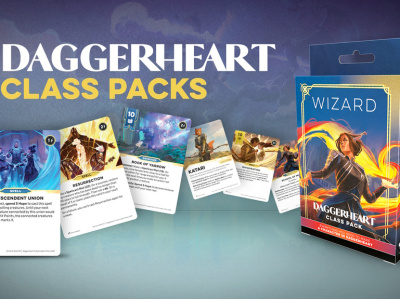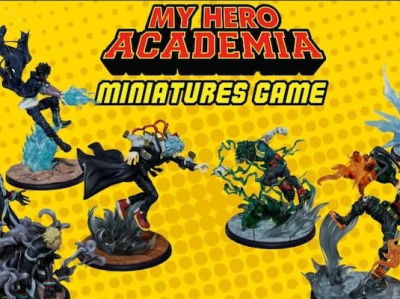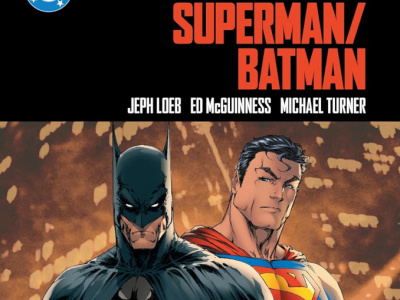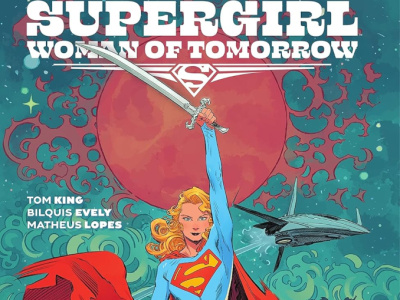
We spoke with CrossGen founder and CEO Mark Alessi at the recent San Diego Comic-Con to get his comments on comic distribution (he thinks it favors the big guys), find out about CrossGen's educational initiative (using comics to teach reading), and the future of his company (how long will it take to be #1?). In this brief but far-ranging interview, we got a taste of why CrossGen has been one of the most successful new comic companies of the last five years.
In other venues I've seen you express dissatisfaction with the current state of distribution in the comic world. Can you tell me what aspects of the current distribution system you take issue with?
The biggest problem with the current distribution system is that it's primarily designed to support, quote unquote, the Big Four. The Big Four have an opportunity to offer to retailers discounts based on quantity of purchases, extra percentages off, they get to set their own pricing, they get a similar if not greater level of service from Diamond as all the rest of the distribution clients get, but at a greatly reduced charge and cost. It makes it difficult for us to compete effectively because I can't say to Joe Retailer, 'If you buy fifty copies of Sojourn, I'll give you sixty per cent off, instead of fifty per cent off.' I don't have the ability or the right to make adjustments based on volume, or to run special deals. Plus I have significant additional costs that I need to pay Diamond that other people in the Big Four don't have to, so there are savings that we can't pass on to retailers that we'd very much like to. The initiative for compendia was designed primarily to allow retailers to offer a broad spectrum program at different price points and different products. You buy an individual comic at $2.95, or you can buy the equivalent of seven comics for basically ten, eleven dollars, which is about the price of three with tax [speaking of CrossGen's trade paperback anthologies Edge and Forge]. We even reduced our graphic novels down from $19.95 to $14.95/$15.95 so we could give a better price point so retailers could keep customers or bring new customers in.
What is your vision of how distribution should work? I ask that broadly in terms of multiple channels. Right now you're in comic stores and bookstores. Those are your two primary channels of distribution, right?
Actually, we're probably right now in every single form of distribution possible. We're in bookstores, we're in direct-market stores, we're on the Internet. Soon we'll be in movies and television. We're working very closely now and believe we'll be in a position to cut some deals with newspaper chains, so every single form...
You're talking more broadly about distribution of the intellectual property.
Distribution of the intellectual property's necessary because you need to make it apparent. We've lost three generations of potential purchasers to things like video games and other alternative forms of entertainment. You really can't say that's the cause, because in Japan, which has all the same kinds of electronic options for entertainment-- DVDs, television, music, etc.--they sell between 1.4 and 1.6 million copies of books per month on their high end, whereas we sell 100,000 on our high end with a significantly greater population.
In a perfect world, how would distribution work?
Everyone would get the same kind of basic terms. You can make it on your own, or you can fail on your own. But if you basically say to everybody but the Big Four, that the rule set is different for you, and you have to pay higher fees and you have to pay higher charges for the same services, and you don't have the ability to offer the retailer options and pricing discounts and advantages so they can work more effectively to grow their consumer base, then you're not able to play on an even playing field. Right now, for all intents and purposes, the comic book publishing industry is a game of soccer. The Big Four get to put eleven players on the field, and everybody else gets to put between nine and three. It makes it tougher to compete and win the game, which is why you've seen so many publishers go out of business that were well-financed over the last ten years. It's not just the money, it's an opportunity to compete fairly. If we don't compete fairly, we can't give the product mix to the retailers so they can sell.
The other part of it is there's a big responsibility that publishers have to put product out on time. Every retailer I've ever met gets his rent bill every month, pays his employees every month, and he orders product. He expects to make a profit off his product so he can pay his other bills. When the books don't show up, you can't sell them so you can't make a profit, but your fixed costs still remain. A lot of the mid-size to smaller retailers in particular run on fairly narrow margins. It's difficult to ask people to work under those parameters. You can't say, 'Here's the top hundred books in the country,' and then have as much as thirty, forty per cent of the top twenty ship late. That's where you're investing your money. That's where the retailers invest their planned money for their planned return. When that doesn't happen, they have no product to sell. I think there should be legitimately significant penalties to publishers who can't deliver product to retailers when it's solicited. I think they should be enforced. It's a binding commitment. It's a responsibility. It's a food chain. If you kill all the plankton, and I've said this before, the whales will die. Don't wonder why.
Can I get you to say just a few words about CrossGen's educational initiative?
One of the thing's CrossGen is committed to is reading. We're not necessarily big on collecting, which is why we make our books available in print almost forever. The whole objective is to get kids to read. What we've done is, we've developed a product called 'Comics On The Web.' We've developed initiatives so that our product right now is sold, the entire line, in 33 different countries in 12 different languages with the commitment that they return the translated files. We've also taken three of our products, Meridian for grade school, Sojourn for middle school, and Ruse for high school, and we're putting audio and soundtracks on them. We can basically have talking comic books. We build classroom curriculums designed on government standards and activity guides so that kids can have an opportunity (particularly those who have attention deficit, a lack of reading interest, disorders, or have English as a second language, kids who are struggling with a new language) to see the word balloon in their language, see it in English, hear it spoken in English. They get the bridge between the eye candy, which they get in their video games, DVDs, and getting to see it on the screen in a classroom. They have an opportunity to pass some basic testing to get to read the next book in the series. Hopefully it's an opportunity for a large group of young people (who haven't been exposed to comics because their parents don't take them to comic book stores like my parents used to take me) to become interested in reading fiction, whether it be science fiction, historical fiction, even super hero fiction. The whole objective is if you read that, and you enjoy that, and we can find a bridge between eye candy and reading, maybe someday some of these kids will read Hemingway, or Shakespeare, or Marlowe. We get kids reading again.
Last question: where do you see Crossgen in two years?
Number one.
Any elaboration?
We're going to be the most broad-spectrum, most widely-published properties in the entire world because we didn't make CrossGen comics just for America. We made CrossGen comics for the world. You look through our comic books. They're not set in the United States, they're not set in Manhattan, they're set on planets all throughout the universe in the future. We have no gender bias, we have no ethnicity bias, we have no cultural bias, we have no religious bias. In fact, one of the things we got feedback on from the People's Republic of China, when they approved the publishing of our entire line, was that, when they looked at our comic books, they weren't offended as Chinese because there was no cultural relationship between the fun story-telling and the United States. Much as I'm a big Captain America fan, and a Superman fan when I grew up, you're not going to sell Superman and Captain America in the People's Republic of China.







